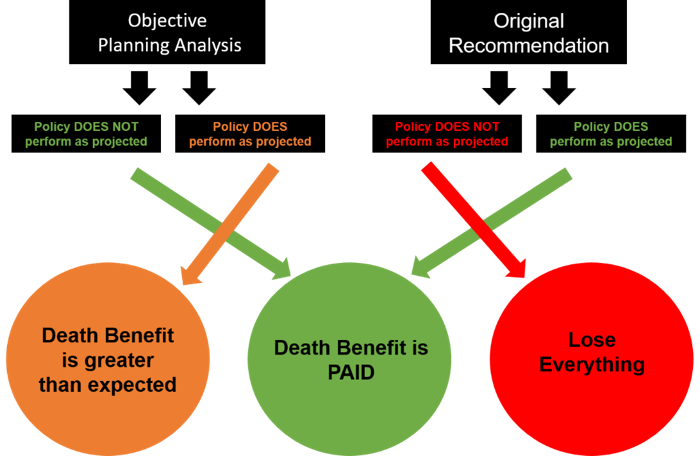All Categories
Featured
Table of Contents
1), frequently in an effort to beat their classification averages. This is a straw man debate, and one IUL folks love to make. Do they contrast the IUL to something like the Vanguard Total Amount Stock Market Fund Admiral Shares with no lots, an expenditure proportion (EMERGENCY ROOM) of 5 basis points, a turn over ratio of 4.3%, and a remarkable tax-efficient record of distributions? No, they compare it to some horrible proactively managed fund with an 8% load, a 2% ER, an 80% turn over proportion, and a horrible record of short-term funding gain distributions.
Common funds typically make annual taxed circulations to fund owners, also when the worth of their fund has actually gone down in worth. Mutual funds not just need earnings coverage (and the resulting yearly tax) when the mutual fund is rising in worth, but can likewise enforce earnings tax obligations in a year when the fund has gone down in worth.
That's not just how mutual funds function. You can tax-manage the fund, gathering losses and gains in order to reduce taxable circulations to the financiers, but that isn't in some way going to change the reported return of the fund. Just Bernie Madoff kinds can do that. IULs avoid myriad tax obligation traps. The possession of common funds might call for the shared fund proprietor to pay projected taxes.

IULs are very easy to position to make sure that, at the owner's death, the recipient is exempt to either income or estate tax obligations. The very same tax obligation reduction strategies do not function nearly also with mutual funds. There are various, frequently expensive, tax obligation catches related to the timed acquiring and marketing of shared fund shares, traps that do not use to indexed life insurance policy.
Opportunities aren't really high that you're mosting likely to undergo the AMT because of your shared fund circulations if you aren't without them. The rest of this one is half-truths at best. As an example, while it holds true that there is no revenue tax obligation due to your beneficiaries when they acquire the profits of your IUL policy, it is also true that there is no income tax obligation because of your successors when they inherit a mutual fund in a taxed account from you.
Iul Insurance Meaning
The government estate tax obligation exemption restriction is over $10 Million for a pair, and expanding yearly with rising cost of living. It's a non-issue for the vast bulk of medical professionals, much less the rest of America. There are much better means to prevent estate tax problems than purchasing investments with low returns. Shared funds might cause income tax of Social Safety advantages.

The development within the IUL is tax-deferred and may be taken as free of tax earnings by means of car loans. The policy proprietor (vs. the common fund manager) is in control of his/her reportable earnings, therefore allowing them to reduce or perhaps eliminate the taxes of their Social Security advantages. This is wonderful.
Below's one more minimal concern. It holds true if you purchase a common fund for say $10 per share right before the distribution date, and it distributes a $0.50 circulation, you are after that mosting likely to owe tax obligations (probably 7-10 cents per share) regardless of the fact that you haven't yet had any type of gains.
But ultimately, it's actually regarding the after-tax return, not just how much you pay in tax obligations. You are mosting likely to pay even more in taxes by utilizing a taxed account than if you buy life insurance. You're also possibly going to have more cash after paying those tax obligations. The record-keeping needs for having mutual funds are considerably a lot more complex.
With an IUL, one's records are kept by the insurance provider, duplicates of annual statements are mailed to the proprietor, and circulations (if any type of) are completed and reported at year end. This one is also type of silly. Obviously you should keep your tax documents in instance of an audit.
Books On Indexed Universal Life
Hardly a factor to get life insurance. Mutual funds are frequently part of a decedent's probated estate.
Additionally, they go through the hold-ups and expenditures of probate. The profits of the IUL plan, on the other hand, is constantly a non-probate circulation that passes beyond probate straight to one's called beneficiaries, and is consequently exempt to one's posthumous creditors, undesirable public disclosure, or similar hold-ups and expenses.
Medicaid disqualification and lifetime earnings. An IUL can supply their proprietors with a stream of earnings for their whole life time, regardless of exactly how lengthy they live.

This is beneficial when organizing one's affairs, and transforming assets to earnings prior to a nursing home arrest. Shared funds can not be transformed in a comparable manner, and are often thought about countable Medicaid possessions. This is one more stupid one advocating that bad individuals (you know, the ones who require Medicaid, a federal government program for the inadequate, to spend for their retirement home) need to utilize IUL rather than mutual funds.
Universal Life Insurance Tax Benefits
And life insurance coverage looks terrible when contrasted relatively versus a retired life account. Second, people that have money to buy IUL over and beyond their pension are mosting likely to have to be dreadful at taking care of money in order to ever get Medicaid to pay for their assisted living home costs.
Persistent and incurable disease biker. All policies will enable a proprietor's very easy access to cash money from their policy, commonly waiving any type of surrender penalties when such people endure a major disease, need at-home treatment, or come to be confined to a nursing home. Mutual funds do not offer a comparable waiver when contingent deferred sales fees still relate to a shared fund account whose owner requires to offer some shares to fund the prices of such a keep.
Top Iul Carriers 2020
You get to pay even more for that advantage (motorcyclist) with an insurance plan. Indexed global life insurance policy offers death benefits to the recipients of the IUL owners, and neither the proprietor nor the recipient can ever lose money due to a down market.
Now, ask on your own, do you in fact need or desire a fatality advantage? I absolutely don't require one after I get to financial independence. Do I desire one? I suppose if it were low-cost sufficient. Certainly, it isn't affordable. Usually, a purchaser of life insurance policy spends for truth cost of the life insurance policy advantage, plus the prices of the policy, plus the revenues of the insurance provider.
Universal Life Online
I'm not completely certain why Mr. Morais threw in the entire "you can not lose money" once more here as it was covered quite well in # 1. He simply intended to duplicate the most effective selling factor for these things I mean. Again, you do not shed nominal bucks, but you can lose real bucks, in addition to face significant chance cost as a result of low returns.

An indexed universal life insurance policy plan owner may trade their policy for an entirely different plan without setting off earnings taxes. A shared fund proprietor can stagnate funds from one common fund firm to an additional without offering his shares at the previous (therefore causing a taxable event), and buying brand-new shares at the last, frequently subject to sales fees at both.
While it holds true that you can trade one insurance coverage plan for one more, the factor that people do this is that the very first one is such a horrible plan that also after purchasing a new one and experiencing the very early, negative return years, you'll still appear in advance. If they were marketed the appropriate plan the very first time, they shouldn't have any type of wish to ever exchange it and undergo the very early, negative return years once again.
Table of Contents
Latest Posts
Is Universal Life Whole Life
Universal Life Brokers
Index Whole Life Insurance
More
Latest Posts
Is Universal Life Whole Life
Universal Life Brokers
Index Whole Life Insurance